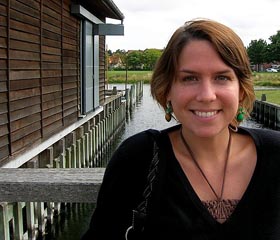Like a lot of environmentally minded UCSC students, Lara Hale commutes by bike or bus, washes her laundry in cold water, and avoids plastic water bottles.
But Hale is one of only a few students who traveled last summer to the Lolland region of Denmark, where residents are overcoming their dependence on fossil fuels.
As part of a first-ever university exchange program, Hale visited wind farms, biogas plants, and waste incineration facilities. She and about 20 other students from California and Denmark immersed themselves in renewable energy projects and learned from Danes who made a commitment in the 1970s to become energy independent.
"Seventy percent of the electricity they generate is from renewable sources," said Hale. "The trip showed me that it's possible." Hale attributes Lolland's success to a three-pronged focus on research, product development, and a level of community involvement that encompasses decision making and investment.
"Lolland is particularly interesting because it's a less well-to-do area, and it was economically depressed in the 1970s," she said. "They started with wind power. They rejected nuclear energy as too risky and too expensive." Wind farms and biogas plants are co-owned by residents, with neighbors who live closest to the facilities owning more shares. "So it isn't just about where I live but what I'm invested in monetarily, as well," Hale explained. Hale, who calls herself a "technological optimist," was particularly impressed by a municipal waste incineration process that has reduced dioxin production by 99 percent since 1988. "It's important not to be a naysayer just because the technology isn't here now. You create it," she said.
Hale was selected to participate in the summer program after taking a course in renewable energy sources from Ali Shakouri, a professor of electrical engineering in UCSC's Baskin School of Engineering. "He has a great interest in placing our current energy issues in the context of history," she said. "That class really gave me a sense of how central our energy usage is to climate change. Energy is becoming my main interest." A re-entry student, Hale, 26, is a third-year senior with a combined major in biology and environmental studies. She credits a 10-month stint with AmeriCorps for igniting her passion for environmentalism. "It spoils you. You get accustomed to spending all day outdoors," recalled Hale, who helped document the degradation of streams that flow into Chesapeake Bay.
Hale chose UCSC for its interdisciplinary environmental studies program, as well as for its natural beauty and proximity to San Francisco. Favorite classes so far include a course in aquatic toxicology with professor Russ Flegal--"He's outstanding"--and a course about United States and Middle East energy politics called Blood and Oil with environmental studies professor Alan Richards. "It's the kind of class that's so good it's hard to sit through," she said. "You feel the weight of the world."
Hale is making the most of her college experience. She helped environmental studies professor Greg Gilbert establish a research plot on the UCSC forest reserve ("He is incredibly knowledgeable, supportive, patient, and has such high hopes for we undergrads," she said of Gilbert), and she is currently helping shape the nascent Sustainable Engineering and Ecological Design (SEED) program. Hale completed an internship in the campus Sustainability Office and now works part time as a classroom assistant for the electrical engineering class Sustainability Engineering and Practices. In January, she heads to South Africa with the Education Abroad Program.
With an eye toward graduate study in either international relations or urban planning, Hale considers herself part of the "dying breed" of students pursuing a liberal-arts education. "Students are eager to focus, to start working and to make a difference," she said. "But I'm here to learn, not just to do."



